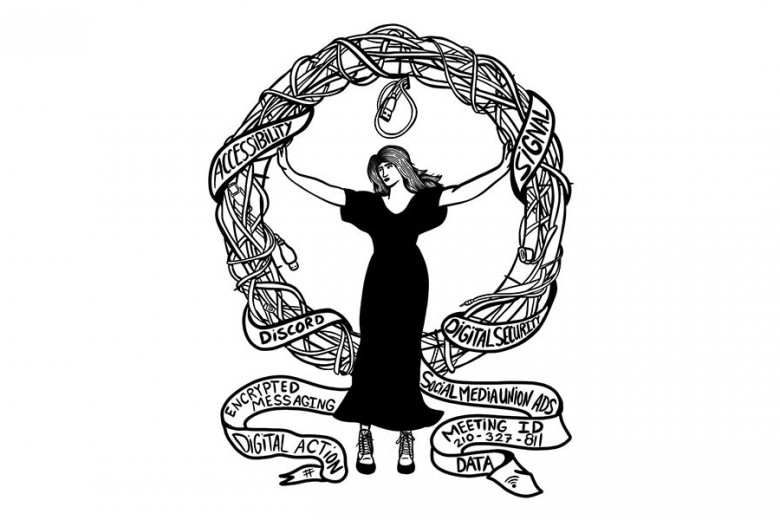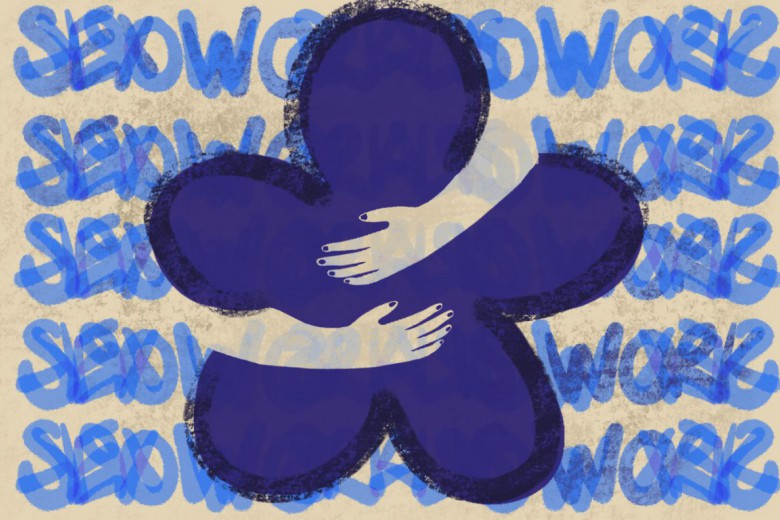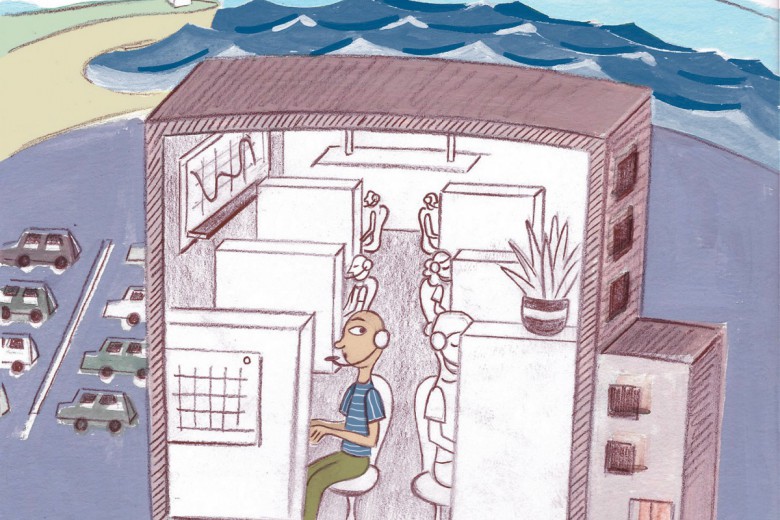Mariam turns on location tracking when she’s en route to a date. Coordinating with her roommate, she sets a time by which she will send them a check-in text. Her purse contains one bottle of water-based lubricant, a strip of latex condoms, her wallet and keys, and a small pocket knife. She’s alone.
Standing outside a Nuns’ Island condo complex, she refreshes her SeekingArrangement messages. Her client is 10 minutes late. She sits on the edge of a concrete planter, examining his profile. It ends with a familiar note: “no escorts, please.”
American legislation such as the Allow States and Victims to Fight Online Sex Trafficking Act and the Stop Enabling Sex Traffickers Act (FOSTA/SESTA) has led to the demise of classified advertising sites popular among American and Canadian sex workers, like Backpage and Craigslist Personals. Shuttering these sites has made sex workers even more vulnerable to violence – they are unable to screen clients and are often forced into working on the street. But SeekingArrangement is alive and well.
The “end demand” approach to criminalizing sex work means that sex work has been pushed into the shadows, where sex workers are liable to face even more violence.
Seeking – as it’s known to its users – is a website that facilitates sugaring, a type of sex work where “sugar babies” participate in typically long-term romantic and sexual relationships with “sugar daddies” (or occasionally “sugar mommies”) in exchange for money and gifts.
As Mariam’s client made clear, many sugar daddies balk at the notion that sugaring is sex work. The same is true of many sugar babies (a term I use with some hesitation, as many who fall into this category aren’t fond of its infantilizing overtones). Seeking is marketed as a dating site, prohibiting “any commercial endeavors” and mandating that members “will only use the Service in a manner consistent with […] local, state, national and international laws.”
But in reality, sugaring is subject to the same legal restrictions as other forms of sex work in Canada – it’s criminalized. That means it’s legal to be a sex worker, but illegal to be a client – purchasing sex, communicating to purchase sex, or receiving money from another person’s sex work is a criminal offence. According to Sandra Wesley, executive director at Montreal-based sex worker advocacy organization Stella, “we understand that police are not targeting these types of workers as often – but under Canadian law, it is a criminal offence to advertise [the sale of someone else’s] sexual services,” which is what Seeking does for many sugar babies.
Sugaring is precarious work – there are no benefits programs, unions, job security, employment insurance (EI), or guarantees of fair payment. The “end demand” approach to criminalizing sex work means that sex work has been pushed into the shadows, where sex workers are liable to face even more violence. Total decriminalization of sex work would certainly solve many of the problems that sugar babies face. But as we push toward decriminalization – a fight that has been long and frustratingly slow – sugar babies are also trying to develop institutional and community-based mechanisms to keep each other safe and ensure they’re being paid fairly. But, as with other app-based work in the gig economy, sites like Seeking aren’t making that easy.
Sugaring, gig work, and precarity
Nadia* began sugaring in October of 2017, as a part-time student with a low-paying side job at a local non-profit. “I am relatively financially secure. In a complete emergency my parents could theoretically support me. It’s not a question of survival,” she tells me. “Until eight or nine months ago, this money was very much supplemental.”
Seeking emphasizes the fact that many of its users are students – according to the site, the past year saw a 44 per cent increase in sugar babies using the website who were registered as students. Three Montreal universities – McGill, Université du Québec à Montréal, and Laval University – have a combined 1,643 students who are signed up to the site as sugar babies. Working through personal networks and social media, I recruited interviewees from Montreal schools.
It illuminated the general nature of many sugaring relationships: older men with generational wealth, paired with young, educated women with enough class privilege to attend university.
For most students, working as a sugar baby is an outcome of increasing costs of living – in Montreal, this is a result of the city’s gentrification-fuelled increases to the price of housing. According to Seeking, almost 80 per cent of a sugar baby’s payment goes toward rent, textbooks, and tuition. The site even began marketing itself as a form of student debt relief. It illuminated the general nature of many sugaring relationships: older men with generational wealth, paired with young, educated women with enough class privilege to attend university.
“Initially, when sugaring [became] my only source of income, I did it in a hand-to-mouth way to cover immediate expenses […] like for rent,” Nadia explains. “I saw like, four people in less than a week and so I made that money very quickly.” She worked like this for a while until she eventually developed a small pool of “regulars” with whom she meets consistently. “There are people who come to town for work regularly or hit me up to spend time every couple of weeks.”
If sex were factored out of the equation, sugaring might look an awful lot like a gig job: where sugar babies are temporary, short-term independent contractors, the structure of their work similar to Uber drivers or bike couriers. Just as 60 per cent of Uber drivers work less than 10 hours weekly while maintaining other employment, many sugar babies see a small handful of clients each month to make ends meet.
If sex were factored out of the equation, sugaring might look an awful lot like a gig job: where sugar babies are temporary, short-term independent contractors, the structure of their work similar to Uber drivers or bike couriers.
Subject to the same economics of beauty as other sex workers, sugar babies can only make money if they are desirable, well-located, and willing to compromise on their sexual boundaries. Even sugar babies who are seen as attractive essentially function on a per-client basis – just as a bike courier might only make a profit by taking on a dangerous and unsustainable volume of orders, the average sugar baby working per meet will need to maintain a wide network of clients to make a living. This is exacerbated by the reality that most sugar babies don’t charge by the hour, as an escort or masseuse might – rather, they receive a lump sum for dates. Bike couriers are denied benefits, EI, and living wages because they’re independent contractors; existing within the legally dubious matrix of sexual labour, sugar babies are denied these same rights on the grounds that they aren’t workers to begin with. Rather, they’re romantic companions.
These conditions complicate sugar babies’ capacity to identify with – and benefit from – sex worker advocacy projects.
“Built to isolate”
A few months ago, Nadia was messaged on Seeking by a friend’s former client and assaulter. Had she not been warned by her friend, she would have met up with the man in question.
“This is another hugely damaging corollary of how [sites like Seeking] are set up,” says Nadia. “Sugar babies don’t see each other’s profiles. It’s built to isolate; it leaves us vulnerable. I only know about predators because of friends. […] If I hadn’t been warned about these men, I would’ve definitely gone home with them, so it’s all up to random chance. I’ve reported people who are still on the site. The conclusion that I am forced to come to is that Seeking doesn’t give a shit.”
When Foodora bike couriers in Toronto started a unionization drive in the summer, it was a groundbreaking case that could create Canada’s first certified bargaining unit for app-based workers. But organizers struggled to connect with couriers across the city, in part because the Foodora app deliberately doesn’t let couriers view or contact each other.
“We talked to folks we had immediate commonalities with. But the workforce is much bigger than that,” says Thomas McKechnie, an organizer with Justice for Foodora Couriers. “It’s easy [for me] to connect with another white downtown bike courier who’s also an artist; it’s harder to get in touch with a recent immigrant living in North York and supporting his family.”
Like with Foodora couriers, it’s hard for sugar babies to get in touch with each other – the necessary prerequisite to any kind of collective organizing.
In web-based gig jobs, online platforms and faceless bosses allow for easier diffusion of responsibility when things go awry. Like with Foodora couriers, it’s hard for sugar babies to get in touch with each other – the necessary prerequisite to any kind of collective organizing. However, the legal ambiguity and stigma of sugaring also produces more acute risks.
Emily* became a sugar baby in her first year of undergrad. She was newly 18, with minimal prior sexual experience. “The first guy I sugared with was a complete asshole, and I had no idea how to set boundaries. When I experienced sexual violence [in that relationship], I was like, there’s no one that I could report this to because of what I’m doing.”
Her client turned out to be a convicted sex offender who had been charged with child luring. Despite Emily’s attempts to flag his Seeking profile – which entailed uploading his mugshot to the website – his profile is still active and he is still employed as an executive at an accounting firm. Seeking’s terms of use stipulate that “If you become a Member, you represent and warrant that you have never been convicted of a felony and that you are not required to register as a sex offender with any government entity.” Seeking says that members can be verified by submitting to a third-party background check, and has insisted that they review and respond to member reports individually.
“The [financial] dynamic that exists makes it harder to assert limits, and it’s almost harder because we have this long-term friendship.”
Certainly, safety concerns look different for each sugar baby. Unlike most of my interviewees, Lana* has maintained one long-term but casual relationship with a client for the past two years. She has never seen any other clients.
“My experience has been positive. I do think of it as mentorship, [and] we share professional interests,” she tells me. “But even though I don’t actively fear violence and retaliation, there have been times where I’ve had my [sexual] boundaries pushed against. The [financial] dynamic that exists makes it harder to assert limits, and it’s almost harder because we have this long-term friendship.”
Like many independent escorts, sugar babies lack even the illusion of a support or security presence who could ensure that their rights are respected. One interviewee, Hazel,* worked at a massage parlour for two years and spent some time at escort agencies before going independent. “Starting from a shared workplace allowed my boundaries to be enforced externally. I could invoke this mysterious greater power – the parlour, the agency – to set them,” she says. Even though many of these agencies don’t maintain particularly stringent security details – such as keeping drivers or security guards on standby – their assumed existence is useful for workers like Hazel. “When I went into working independently, I had to learn to go from ‘the house says no’ to ‘I say no.’ I started experiencing way more pushback on my boundaries.”
For these sugar babies, the issue at hand is their isolation from one another and their lack of a shared workspace. Emily has two close friends who also sugar, but she “[doesn’t] have avenues to meet other people who sugar, and one of the things that always comes up is that we can’t see one another[’s profiles on Seeking]. It’s created an online format where we can’t discuss our experiences together.” This makes it extremely difficult for community responses to manifest. Nadia, who has curated a “bad date list” of dangerous or disrespectful SeekingArrangement daddies in Montreal, struggles to make connections with her peers in the sex industry – and as a result, her list can’t circulate. Further, unlike most bad date lists put out by sex worker advocacy organizations, Nadia’s Google spreadsheet contains clients’ identifying information (such as their legal names and phone numbers) that could open her up to being sued for libel – especially given how much high-status clients stand to lose.
Asking for it: On prices and payment
“I don’t know if this is a hot take or not, but sugar babies should just hook,” Hazel tells me. “They make less money than escorts. I want them to make more than they do.”
Shortly after transitioning to independent escorting, Hazel started seeing a couple regularly. They requested to see her as a sugar baby rather than as an escort. She asked what that would entail, and in response they requested a discounted rate. “Clients want to stretch their money. From a worker perspective, why would I ever let them do that?”
A particularly damaging aspect of sugaring is the fact that it masks itself as dating. Sugar babies are less empowered to assert the necessity of payment for their services, in part because most clients on sites like SeekingArrangement are looking for relationships that don’t feel transactional. Any attempt at price negotiation can mean losing clientele. As Mariam – who has sugared and worked as an independent escort – puts it, “if you’re sugaring, 50 per cent of it is pretending you’re not a sex worker. […] You really just hope that you’ll get a positive response to a per-hour rate, because so many clients will just reply like, ‘I don’t want a hooker.’ But at least hookers get wages.” When sugaring, Mariam finds herself in bizarre situations where payment is concerned – like the time one particular client insisted on paying her less than half of her standard $200-per-hour rate on the grounds that he “knows that he’s a catch” and would allegedly be just as successful in the world of conventional dating.
“Clients want to stretch their money. From a worker perspective, why would I ever let them do that?”
One outcome of this is that sugar babies tend to accept what they can get from clients. Emily mentions that with her first regular client, demanding more wasn’t on the table. “I saw him exclusively for a while. He didn’t want to do pay-per-meet or an allowance, because he just wanted to feel like I was there willingly, though he’d occasionally just throw a hundred at me. He would give me money when I explicitly said I needed it for, like, textbooks or something.”
“Sugaring can be very lucrative if someone finds the one super-rich daddy who’s gonna give them several thousand dollars a month as an allowance,” says Wesley of Stella. “But most people find men who are too cheap to pay sex workers their rates for sex, and they try to manipulate people who don’t want to be seen as sex workers instead.” This reality punctures Seeking’s branding attempts as a high-end dating site, one “where Sugar Babies enjoy a life of luxury by being pampered with fine dinners, exotic trips and allowances” (as per the site’s “about us” section). Seeking says that on average, students receive a “monthly allowance” of $2,925, though how they calculated that number is unclear and they did not respond to requests for clarification.
While clients posture as wealthy, upper-class professionals, they simultaneously mask their unwillingness to compensate service providers fairly as moral righteousness. Very few of my interviewees maintained relationships that involved any type of romantic attachment whatsoever – far more commonplace is meeting discreetly for sex, with the occasional rendezvous for drinks beforehand. Yet the language of class ascendancy ironically prevents sugar babies from articulating their right to payment in these arrangements.
“Often clients from Seeking expected additional services like sexting or nudes. As an independent, I can charge for those things.”
Sugar babies often find themselves performing unpaid labour to maintain the illusion of non-transactional romance with clients. Nora,* an independent escort, started off on Seeking with the intention of coming up with the money to purchase paid ad space on escort advertising sites like Tryst. She noticed that the time commitment for sugaring was far higher, in part because of the expectation that she would be putting effort into building an “authentic” interpersonal relationship with clients. “Often clients from Seeking expected additional services like sexting or nudes. As an independent, I can charge for those things.” Nora also found that negotiating rates became easier after transitioning to working as an escort. “I’d be like, ‘I’m never going to accept less than $250 for a date,’ but I had a lot of trouble with negotiating. I was never firm. Now, I am very no-nonsense, like, ‘I am $300 per hour and that’s it.’”
Certainly, negotiation is a learned skill – but for most other sex workers, peers and mentors facilitate this learning process. “It’s kind of fucked up when people talk about [money] a lot. It’s pretty unhealthy insofar as it can expose class and racial divisions within the sex worker community. A lot of your earning potential is determined by how our society values and devalues certain bodies, and more privileged workers often can be oblivious to the financial constraints that others face,” admits Hazel. In many cases, marginalized sugar babies such as trans women are not necessarily in “low demand” – they may actually be receiving many more client requests than their cisgender counterparts. But because their labour is assigned less value, they are more likely to deal with constant lowballing by clients.
“But also,” Hazel continues, “I need to know what the going rate is in my city, and if I’m not charging enough.” Without access to their peers’ profiles, many sugar babies unknowingly lose out on negotiating fair wages and, by extension, the profits of their sexual labour.
Sex workers’ solidarity
In Wesley’s experience at Stella, sex workers who exclusively use sites like Seeking don’t access her organization’s services – like free STI tests or accompaniment to police stations – as frequently as other sex workers. Certainly, some sugar babies don’t feel comfortable accessing these services because of whorephobic attitudes toward other full-service sex workers. However, many of my interviewees – particularly those who did identify as sex workers – expressed that they felt that their relative financial security made accessing community resources feel inappropriate. Nora, for example, would feel guilty using Stella’s free medical clinic or even attending community-building events. “I’m getting by – so many people aren’t. I don’t really have a network, [but] I’m still quite privileged.”
Nora’s position makes sense. But so do the benefits of developing collective strength with other sex workers – a move that transcends, but doesn’t efface, the internal hierarchies of the industry. Fundamentally, sex work is not an identity – it is a job, and any ensuing push for better rights on the job must be based around affinity and not what a particular worker “is” or “is not.”
“A huge part of [the] Bedford [Supreme Court case, which challenged the constitutionality of Canadian sex work restrictions] was the notion that working together is good for our safety.”
“‘Sex worker’ doesn’t allude to a coherent category,” says Wesley. “People have jobs in the sex industry, as escorts or strippers or whatever. Sure, we have people doing intervention, but we also run community-building workshops, activities.” She also points to the importance of solidarity with less-privileged workers. “Anyone who identifies with being impacted [by stigma] is welcome here, and if someone isn’t comfortable taking services, they can volunteer with us; they can contribute in other ways.” Just as for most isolated workers, accessing community is the first step to collective action – and until sugar babies can comfortably identify with other sex workers they have minimal capacity for organizing. “A huge part of [the] Bedford [Supreme Court case, which challenged the constitutionality of Canadian sex work restrictions] was the notion that working together is good for our safety,” Wesley reminds me. “Because of the Internet, more sex workers are working alone nowadays. […] Anyone who works in isolation can benefit from meeting other workers.”
“If you’re having sex for money you’re a whore. That’s a beautiful, terrible thing,” says Hazel. “A freestyling sugar baby and a street worker are just hanging out at different bars – just not the Marriott bar.”
“[But] we all need some better rights out here.”
*Names have been changed to protect sources’ privacy.







